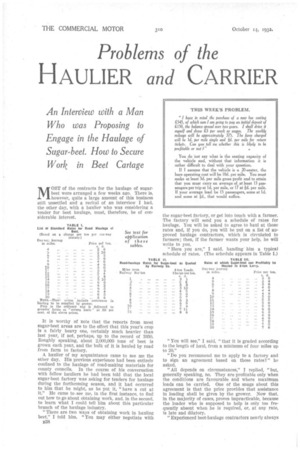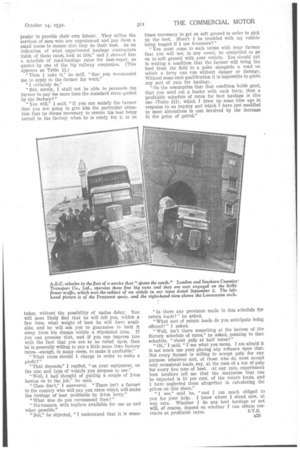Problems of the
Page 64

Page 65

If you've noticed an error in this article please click here to report it so we can fix it.
HAULIER and CARRIER An Interview with a Man Who was Proposing to Engage in the Haulage of Sugar-beet. How to Secure Work in Beet Cartage MOST of the contracts for the haulage of sugarbeet were arranged a few weeks ago. There is, however, quite a large amount of this business still unsettled and a recital of an interview I had. the other day, with a haulier who was considering a tender for beet haulage, must, therefore, be of considerable interest.
It is worthy of note that the reports from most sugar-beet areas are to the effect that this year's crop is a fairly heavy one, certainly much heavier than last year, if not, perhaps, up to the record of 1930. Roughly speaking, about 2,000,000 tons of beet is grown each year, and the bulk of it is hauled by road from farm to factory.
A haulier of my acquaintance came to see me the other day. His previous experience had been entirely confined to the haulage of road-making materials for county councils. In the course of his conversation with fellow hauliers he had been told that the local sugar-beet factory was asking for tenders for haulage during the forthcoming season, and it had occurred to him that he might, as he put it, "have a cut at it." He came to-see me, in the first instance, to find out how to go about obtaining work, and, in the second. to learn what I could tell him about this particular branch of the haulage industry.
"There are two ways of obtaining work in hauling beet," I told him. "You may either negotiate with B38 the sugar-beet factory, or get into touch with a farmer. The factory will send you a schedule of rates for haulage. You will be asked to agree to haul at those rates and, if you do, you will be put on a list of approved haulage contractors, which is circulated to farmers ; then, if the farmer wants your help, he will write to you_ "Here you are," I said, handing him a typical schedule of rates. (The schedule appears in Table I.)
"You will see," I said, "that it is graded according to the length of haul, from a minimum of four miles up to 20."
"Do you recommend me to apply to a factory and to sign an agreement based on these rates?" he asked.
"All depends on circumstances," I replied, "but, generally speaking, no. They are profitable only when the conditions are favourable and where maximum loads can be carried. One of the snags about this agreement is that the price provides that assistance in loading shall be given by the grower. Now that, In the majority of eases, proves impracticable, because the loader who is supposed to help is only too frequently absent when he is required, or, at any rate, is late and dilatory.
"Experienced beet-haulage contractors nearly always prefer to provide their own labour. They utilize the services of men who are experienced and pay them a small bonus to ensure that they do their best. As an indication of what experienced haulage contractors think of these rates, look at this," and I showed him a schedule of road-haulage rates for beet-sugar, as quoted by one of the big railway companies. (This appears as Table II.) "Then I take it," he said, "that you recommend me to apply to the farmer for work."
"I certainly do."
" But, surely, I shall not be able to persuade the farmer to pay me more than the standard rates quoted by the factory?"
"You will," I said, "if you can satisfy the farmer that you are going to give him the particular attention that he deems necessary to ensure his beet being carted to the factory when he is ready for it to be taken, without the possibility of undue delay. You will most likely find that he will tell you, within a few tons, what weight of beet he will have available, and he will ask you to guarantee to haul it away from his dumps within a stipulated time. If you can promise that, and if you can impress him with the fact that you are to be relied upon, then he is generally willing to pay a little more than factory rates—enough, in many cases, to make it profitable."
"What rates should I charge in order to make a profit?"
"That depends," I replied, "on your equipment, on the size and type of vehicle you propose to use."
"Well, I had thought of putting a couple of 2-ton lorries on to the job," he said.
"Then don't," I answered. "There isn't a farmer in the country who will pay you rates which will make the haulage of beet profitable by 2-ton lorry."
"What size do you recommend then?"
" Six-tonners, with trailers available for use as and when possible."
"But," he objected, "I understand that it is some times necessary to get on soft ground in order to pick up the beet. Shan't I be troubled with my vehicle being bogged if I use 6-tonners? "
"You must come to such terms with your farmer that you will not, in any event, be compelled to go on to soft ground with your vehicle. You should put in writing a condition that the farmer will bring the beet from the field to a point alongside a road on which a lorry can run without danger or damage. Without some such qualification it is impossible to quote any sort of rate for haulage. "On the assumption that that condition holds good, that you send out a loader with each lorry, then a profitable schedule of rates for beet haulage is this one (Table III), which I drew up some time ago in response to an inquiry and which I have just modified to meet alterations in cost involved by the increase in the price of petrol."
" Is there any provision made in this schedule for return loads?" he asked.
"What sort of return loads do you anticipate being offered?" I asked.
"Well, isn't there something at the bottom of the factory schedule of rates," he asked, pointing to that schedule, "about pulp at half rates?"
"Oh," I said, "I see what you mean. I am afraid it is not much use your placing any reliance upon that. Not every farmer is willing to accept pulp for any purpose whatever and, of those who do, most accept only occasional loads, say, at the rate of a ton of pulp for every five tons of beet. At any rate, experienced beet hauliers tell me that the maximum that can be expected is 10 per cent. of the return loads, and I have neglected them altogether in calculating the prices on this sheet." "I see," said he, "and I am much obliged to you for your help. I know where I stand now, at any rate. Whether I do any beet haulage or not will, of course, depend on whether I can obtain con tracts at profitable rates. S.T.R.




































































































